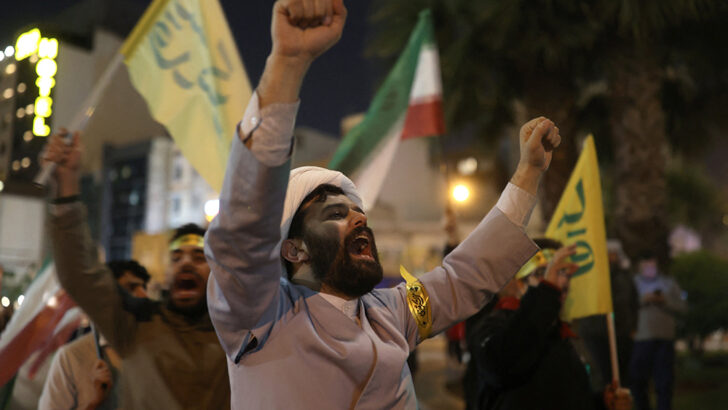Courtney Mares
Cardinal Pietro Parolin, the Vatican’s secretary of state, spoke on the phone last Monday morning with Iran’s new president, Masoud Pezeshkian, in a conversation that underlined the need for dialogue, negotiation, and peace.
According to Vatican spokesman Matteo Bruni, the cardinal “expressed the Holy See’s serious concern about what is happening in the Middle East, reiterating the need to avoid in any way the widening of the very serious ongoing conflict and preferring instead dialogue, negotiation, and peace”.
Retaliation
The August 12 phone call by the Vatican secretary of state to congratulate the Iranian president on beginning his term in office occurred as the threat of a retaliatory attack by Iran looms.
President Pezeshkian reportedly reiterated Iran’s core stance on the need to prevent war and bloodshed and promote global peace and security to Cardinal Parolin but he said Iran has the right to defend itself against any act of aggression.
“Lift its blockade and dispatch aid to the war-ravaged people through consultations with international forums and human rights organisations”
He commended Vatican’s support for the establishment of peace and stability in the world and called for its more active role to end Israel’s crimes in Gaza, lift its blockade and dispatch aid to the war-ravaged people through consultations with international forums and human rights organisations.
US Defence Secretary Lloyd Austin has ordered a guided missile submarine to the Middle East amid reports that Iran may attack within days, The Guardian reported Monday.
Iranian supreme leader Ayatollah Ali Khamenei has said in a statement on his official website that revenge is “our duty” following the assassination of Hamas political leader Ismail Haniyeh in Tehran on July 31.
Israel Defense Forces (IDF) said Sunday that it is on high alert for potential retaliation from Iran and its proxies. The United States, Qatar, and Egypt have been working to broker an agreement to end the Israel-Hamas war.
Iran
President Pezeshkian assumed office in Tehran at the end of July after winning Iran’s runoff presidential election as a reformist candidate promising to reach out to the West. As president, Pezeshkian is the top elected official and second in rank to Iran’s supreme leader, who wields power as commander-in-chief and the Islamic Revolutionary Guard Corps.
Iran is one of the least Catholic countries in the world. Conversion from Islam to Christianity can be a crime meriting a sentence of more than 10 years of imprisonment.
The Latin Catholic Archdiocese of Tehran-Isfahan has six parishes and approximately 2,000 Catholics. Archbishop Dominique Mathieu serves as the current archbishop of Tehran-Isfahan.
“Search for peace will extinguish strife, love will overcome hatred, and vengeance will be disarmed by forgiveness”
At Pope Francis’ most recent general audience, the Holy Father said he was following the situation in the Middle East with great concern
“I reiterate my appeal to all the parties involved that the conflict does not spread and that there may be an immediate cease-fire on all fronts, starting with Gaza, where the humanitarian situation is very serious and unsustainable,” Pope Francis said on August 7.
“I pray that the sincere search for peace will extinguish strife, love will overcome hatred, and vengeance will be disarmed by forgiveness,” the Pope continued.
Relations
President Pezeshkian is shaping his cabinet at a time of an increased risk of escalation of the conflict in Gaza into a broader regional war, after the recent killings of Palestinian Islamist group Hamas’ leader Haniyeh in Iran and of Hezbollah military commander Fuad Shukr in Beirut drew threats of retaliation against Israel.
Following the death of hardline President Ebrahim Raisi in a helicopter crash in May, President Pezeshkian won a snap election last month by promising to improve ties with the world, promoting a pragmatic foreign policy, and to ease social restrictions at home.
President Pezeshkian’s proposed cabinet lineup requires lawmakers’ approval and parliament speaker Mohammad Baqer Qalibaf said that parliamentary commissions were reviewed on Monday last.
Tensions between Iran and the West have increased over Tehran’s fast-advancing nuclear programme and its threats to “harshly punish” Israel over the assassination of Haniyeh.
“The two countries have had formal diplomatic relations since 1954, since the pontificate of Pope Pius XII”
Tehran and Hamas accuse Israel of carrying it out, though it has not claimed or denied responsibility for the killing.
Early relations between the Vatican and Iran began during the reign of Shah Abbas the Great, when the Persian embassies visited the Pope. The two countries have had formal diplomatic relations since 1954, since the pontificate of Pope Pius XII.
Relations have been maintained during the Iranian Revolution. Iran has a large diplomatic corps at the Vatican, with only the Dominican Republic having more diplomats accredited to the Holy See.


 Iranians celebrate on a street in Tehran April 14, 2024, after Iran’s direct attack on Israel. Photo: OSV News/Majid Asgaripour/WANA (West Asia News Agency) via Reuters
Iranians celebrate on a street in Tehran April 14, 2024, after Iran’s direct attack on Israel. Photo: OSV News/Majid Asgaripour/WANA (West Asia News Agency) via Reuters 